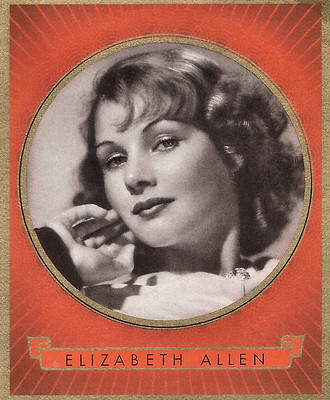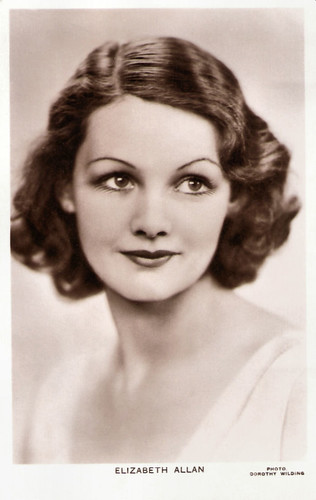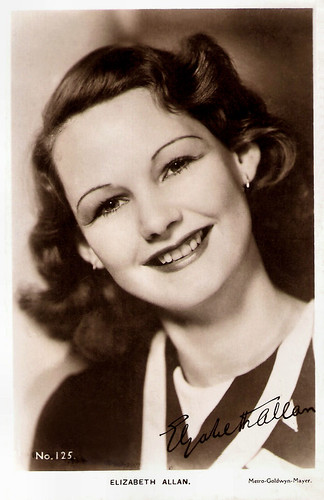
German collectors card in the Bunte Filmbilder series by Greiling-Zigaretten, Series no. 2, no. 484. Photo: Styria-Film / Ross-Verlag.

British postcard by Milton, no. 109. Photo: Metro-Goldwyn-Mayer.

British postcard. Photo: Dorothy Wilding.
A Memorable Year in Hollywood
Elizabeth Allan was born in Skegness, Lincolnshire in 1910 (some sources indicate 1908). She was the youngest of six children born to Dr. Alexander William Allan and Amelia Allan. Briefly, she worked as a kindergarten teacher before becoming an actress. After four years onstage with the Old Vic, she made her film debut in Alibi (Leslie S. Hiscott, 1931) based on the Agatha Christie novel The Murder of Roger Ackroyd and featuring for the first time her famous Belgian detective Hercule Poirot (Austin Trevor).
She also featured in Gainsborough's Michael and Mary (Victor Saville, 1931). This was the first of the Edna Best and Herbert Marshall co-starring talkies. It was based on a play of the same name by A.A. Milne. In the comedy Service for Ladies (Alexander Korda, 1932) she co-starred with Leslie Howard. That year she also appeared in the British thriller The Lodger (Maurice Elvey, 1932) starring Ivor Novello. It is based on the novel The Lodger by Marie Belloc Lowndes, which was already filmed in 1927 in a silent version directed by Alfred Hitchcock and also starring Novello.
In 1932, she married agent Wilfred J. O'Bryen — to whom she had been introduced by actor Herbert Marshall. He took a major interest in her career and their marriage lasted until his death in 1977. In 1933 came her first US production, the drama The Solitaire Man (Jack Conway, 1933), starring Herbert Marshall. In the United States, she worked under contract with MGM.
1935 was her most memorable year in Hollywood. She distinguished herself in two memorable Charles Dickens adaptations, as David's unfortunate young mother in David Copperfield (George Cukor, 1935) and as Lucie Manette in A Tale of Two Cities (Jack Conway, 1935) starring Ronald Colman. Allan was also featured in Tod Browning's Mark of the Vampire (1935) with Lionel Barrymore and Béla Lugosi.
The following year, she had a supporting part in the romantic drama Camille (George Cukor, 1936) starring Greta Garbo. MGM announced her for a leading part in King Vidor's The Citadel (1938), and, when she was subsequently replaced by Rosalind Russell, Elizabeth sued the studio. The studio retaliated by refusing to let her work, and, frustrated, she returned to the UK in 1938.

With Ivor Novello. British postcard by A Real Photograph in the Film Partners series, no. P 41. Photo: Stanborough.

British postcard by Film Weekly Services, London.
Unofficial Propaganda For The War Effort
Back in England, Elizabeth Allan starred in the British crime film Inquest (Roy Boulting, 1939), the thriller Saloon Bar (Walter Forde, 1940) and the comedy The Girl Who Forgot (Adrian Brunel, 1940).
The British war film Went the Day Well? (Alberto Cavalcanti, 1942) was produced by Michael Balcon of Ealing Studios and served as unofficial propaganda for the war effort. In the comedy He Snoops to Conquer (Marcel Varnel, 1944) she starred with George Formby.
By the 1950s, Elizabeth Allan had made the transition to character parts. She played a supporting part in the British disaster film No Highway in the Sky (Henry Koster, 1951), starring James Stewart and Marlene Dietrich.
Particularly memorable is her appearance as Trevor Howard's brittle and dissatisfied wife in the film adaptation of Graham Greene's The Heart of the Matter (George More O'Ferrall, 1953). In 1958, she appeared as Boris Karloff's wife in The Haunted Strangler (Robert Day, 1958).
Late in her career, she was a frequent panellist on television game shows, including the British version of What's My Line?. She was named Great Britain's Top Female TV Personality of 1952 Elizabeth Allan died in 1990 at Hove, East Sussex, aged 80.

British postcard by Real Photograph in the Film Kurier Series, no. 125. Photo: Metro-Goldwyn-Mayer.

British postcard in the Picturegoer Series, London, no. 617. Photo: Stanborough.
Sources: Wikipedia and IMDb.
This post was last updated on 15 April 2023.
No comments:
Post a Comment